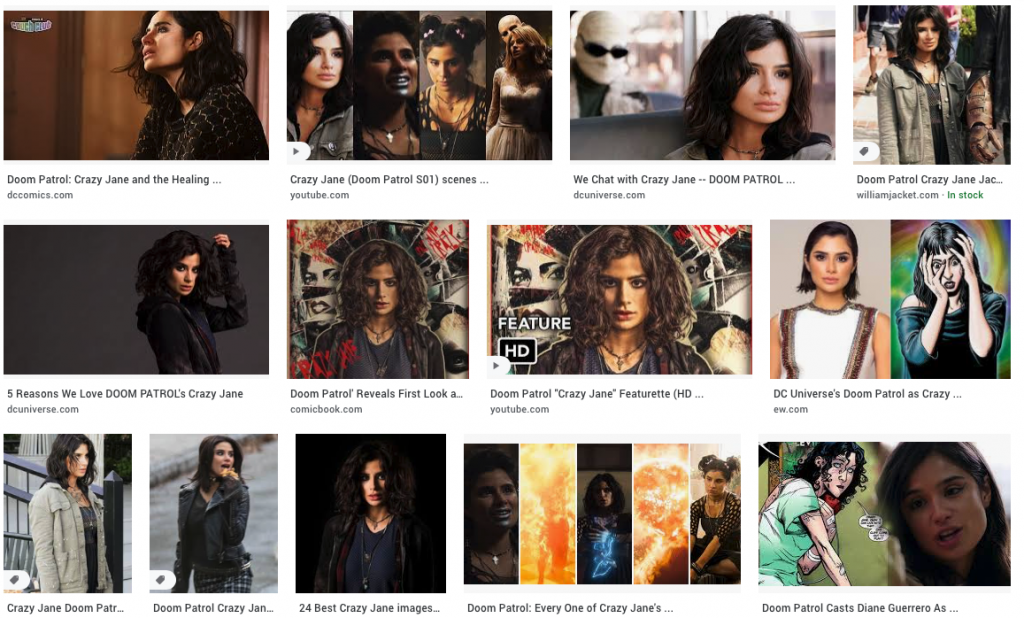
Crazy Jane: How to Create a Great DID Character
We’re only in Season 1, 3rd episode, of DC’s Doom Patrol series and already they’ve earned our respect for positive and sensitive portrayal of main character “Crazy” Jane. I know the name is cringe-worthy, but the first and only character to call them that was Jane& themselves so far. Everyone else just calls them Jane or by the specific name of whom is fronting.
Everyone has respected who is fronting if they know their name. No one has disbelieved them. Only a villain has asked them whether they want to become one person, to be cured of this existence in any way. No one has even so much as hinted that they aren’t taken seriously. It’s refreshing. Even someone meeting Jane& for the first time was just confused as to what was going on as they rapid-switched. No lampooning. They’re a budding superhero with each system member having a super-power of their own and while it occasionally comes with hair or makeup changes, given that they have individual superpowers in the first place, we can buy it.
Episode 3 yields this refreshing conversation between Jane& and Larry Trainor — a bandage-wrapped ex-pilot who has been struggling with how to deal with an energy being cohabiting his body:
Larry: There’s something I’ve been wanting to ask you about. I’m curious how you managed to keep all of your…uh…people in line.
Jane: They’re not my people. I don’t control them. I respect them and their right to exist. Maybe if you weren’t such an OCD alpha douche-waffle, the negative spirit wouldn’t treat you like one.
Well, the crack about OCD aside (no, not acceptable[efn_note]Note to writers: if you want mental health advocates to watch and applaud your writing, don’t shit on other disorders either.[/efn_note]), this is the key to what the plural community knows. We don’t live a better life by dominating, controlling, abusing, commandeering, demanding, or throwing fits when we don’t get our way. And the answer isn’t to make everyone else go away. We get along and are at our best when respecting each other, being compassionate, and recognizing the right of each of us to exist, in the same body, at the same time. Jane& goes on to defend that “we’re all in this together” stance again later in the episode against a villain who wants to convince her that she can be one “again”.
At the end of the episode, Jane& writes “Control is a weapon of fascists.” Indeed, it’s a weapon of all kinds of abusers.
Almost makes us wonder if the writers are plural.
Hats off to actress Diane Guerrero as Jane&, Jeremy Carver (series creator), and the writers for the episode quoted above, Tamara Becher-Wilkinson & Tom Farrell for their portrayal of authenticity in multiplicity and sticking it out together.
We look forward to the rest of the series.
Season 2 is currently being released, both seasons available on HBO Max.
[Edits: added &’s to “Jane& goes on to defend…”, “At the end of the episode, Jane& writes” and “Hats off to actress Diane Guerrero as Jane&…”]

Having watched through end of Season 2 so far, we’d like to add that they poured considerable time and resources into Jane&’s inner world, other characters in her/their head being portrayed by different actors in the inner world, the integrity and activities and set of their inner world and so on. It’s eerily too-accurate in some ways.
Perhaps the series deserves a warning for head-hopping; however there’s enough cultural & community precedent for external folk helping with search & rescue for stuck & lost headmates that we personally feel what they portray in the series (so far, up to end of Season 2) is fair game and folk with DID who resist the idea of externals entering an inner world in any way to be resisting a truth that has hovered around plurality for centuries, if not millennia.
We will catch up with Season 3 during winter break.
Actually big Content Warning for Season 2 Episode 9 (last episode of the season): incest.
There’s other depictions of child abuse (Jane’s past).
Season 3: The first episode was going to be the season 2 finale, and the whole season has some very serious growth along the main character’s story arcs. Because this is a dark, gritty, campy story there’s a lot of “edgy” concepts in it. Drug use, institutionalization, being stuck front, headmates disappearing or going deep, headmate potential “death”, and so on are depicted, so it is an uncomfortable ride — but still not a bad depiction of DID alongside this dysfunctional chosen family of mostly-singular folk (with the exception of Larry).
We still recommend it, so long as you are in a good place for it and don’t use it as a role-model for anything in particular.